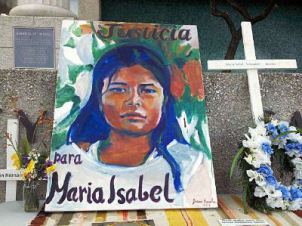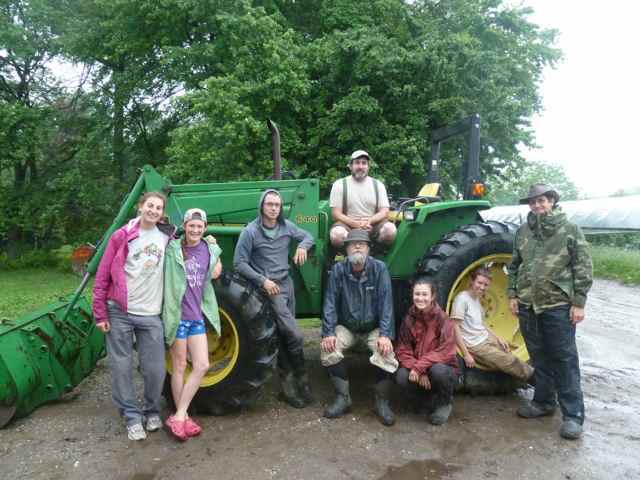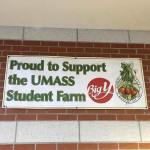
This post originally appeared on the North Amherst Community Farm website.
Maria Isabel Vasquez Jimenez was tying grape vines at a farm in Central California, when the temperature soared well above 95 degrees. Only a few days in the country, this undocumented field worker, who didn’t have easy access to water, shade or the work breaks required by law, passed out from the heat and died two days later.
 Maria was 17 years old. The Center for Disease Control reports that heat-related deaths of farm workers are on the rise in the U.S. This deadly trend is unfortunately one of the costs of cheap food. When you buy cheap food at the big box stores, you also invest in this deadly system of industrialized food.
Maria was 17 years old. The Center for Disease Control reports that heat-related deaths of farm workers are on the rise in the U.S. This deadly trend is unfortunately one of the costs of cheap food. When you buy cheap food at the big box stores, you also invest in this deadly system of industrialized food.
Compare this experience with that of working at a local farm like Simple Gifts in North Amherst. Here the farm workers work hard but are treated fairly. As apprentices who live on the site, they are gaining a valuable education in preparation for the day when they might manage their own farm.

Our industrialized food system of mega-farms, long-distance shipping and big box-stores has driven down the retail price of food to the point that Americans, on average, expend about 9 percent of their annual income on food. The industrial food system in the U.S. produces relatively “cheap” food, but at a cost. Fortunately, in some parts of the U.S., we can partially opt out of this exploitative and costly system.
In our community of Amherst and surrounds, the locally grown vegetables are of higher quality than anything shipped from a distance. We can enjoy the freshness and flavor of the food available at our local farmers’ markets, farm stands, food coops and some regional supermarkets. Yet most experts agree that less than 10 percent of the produce purchased in our region is grown locally.
Why don’t more of us in Amherst “buy local”?
I suspect the reason that 90 percent of the consumers in our fairly progressive region of the country don’t regularly buy local food is due to its perceived higher price and the convenience of shopping at the big box stores.
Busy people treat food shopping as just another task, rather than a pleasurable social experience. Studies indicate that we have 10 times more conversations when we shop at the farmers’ market than at the supermarket. I know when I stop in at the new Simple Gifts Farm Stand in North Amherst, I always bump into friends and neighbors.
The “grand opening” of the new Simple Gifts Farm Stand was an example of the sort of celebration of good food and community, some of us have come to value. When we stop in at Simple Gifts, we invest in a food system that strives toward a better quality of life – for all!
Shopping locally isn’t an “efficient” use of time in a task-driven life – which is one of the reasons I make the effort slow down and shop at the farmers market or Simple Gifts. Yes…. for me, buying locally is an investment in a higher quality of life (for all).
 Some regional supermarkets do try to offer local products. The Big Y in Western Massachusetts, for example, is a family-owned business and a major supporter of the UMass Student Farm, which grows organic vegetables for sale locally. When we do choose to shop at supermarkets, we can support local farmers by asking specifically for locally grown products.
Some regional supermarkets do try to offer local products. The Big Y in Western Massachusetts, for example, is a family-owned business and a major supporter of the UMass Student Farm, which grows organic vegetables for sale locally. When we do choose to shop at supermarkets, we can support local farmers by asking specifically for locally grown products.
And what about price? How often have we heard the statement that local food costs more?
Certainly, local beef, pork and chicken cost more than meat raised in a factory farm. You just can’t beat the efficiency and scale of the industrial animal factory for low price. Hve you ever experienced “sticker shock” when you see that local, fresh eggs may be priced at $5.00 a dozen or more when industrial eggs may be closer to $1.50? Well, there is a reason! Just look at the pictures of local eggs and free-ranged hens compared to factory farmed eggs below….

The fact that local meat products are generally produced with less stress on the animals may not be worth the higher price to some of us. And some people truly can’t afford to pay the higher price for meat, dairy and eggs that are produced in a sustainable manner. But many of us have a choice! On the other hand, there is little difference in price between local and shipped vegetables, especially during our growing season.
If we were truly concerned about the health of the animals, our own health, the health of our community and the health of the environment, we would choose to buy local meat, dairy and egg products, wouldn’t we. We would investment in a higher quality of life for ourselves, for local farm families, our community, and for the animals we consume.
When we buy local bacon and sausages, we can even introduce our children to the live animals that provide these products for us, like “Pig Floyd” at Simple Gifts Farm!

“Cost” includes more than “price”
The industrial food system that produces cheap food does so at a great cost! The retail price does not include the cost of harm done to the workers in the food system; on farms, in factories, shipping terminals, big box-stores, and the fast-food restaurants serving the food. These workers earn near minimum wage. A federal minimum wage law that leaves families in poverty is part of the cost of cheap food.
When we consider the quality of life we enjoy in those regions like ours where local food is plentiful, we might also wonder about the quality of life of those who are working to produce, ship and sell cheap food. When we buy food shipped from long distances, we say “yes” to an exploitative system designed primarily to maximize financial returns of corporate shareholders – at the expense of others.
It is true that relocalization of the food system may result in higher (but fairer) food prices overall. At the same time buying local food will create local jobs and build community.
When you buy your food locally you are making an investment in a higher quality of life (for all). I think this is an investment we can’t afford not to make.
Dr. John M. Gerber is a Professor in the University of Massachusetts Stockbridge School of Agriculture. He serves as academic adviser for over 100 students majoring in Sustainable Food and Farming at UMass Amherst and teaches courses related to sustainable agriculture. John is on the Board of Directors of the The North Amherst Community Farm, a small, local, not-for-profit organization devoted to preserving farmland and promoting sustainable farming practices in the community. A capital campaign was completed in 2016 to preserve a 30+ acre farm property in North Amherst, MA that is currently managed by Simple Gifts Farm.




